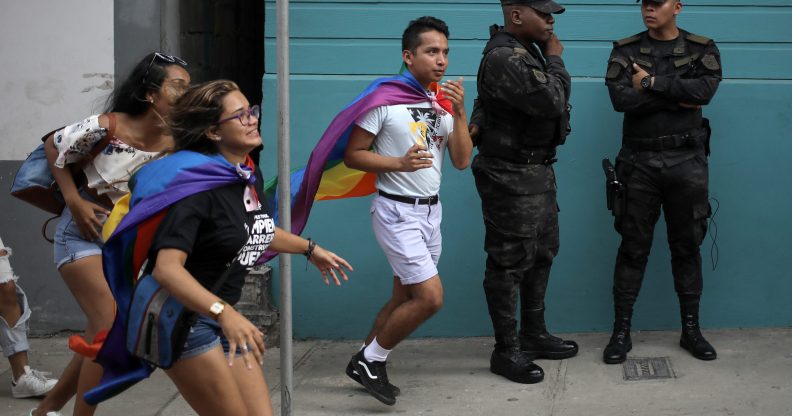Aggressive gender-based lockdowns fail the trans community and heighten injustices, report finds

Police at Panama’s 15th Gay Pride Parade in Panama City on June 29, 2019. (MAURICIO VALENZUELA/AFP/Getty)
Aggressive gender-based lockdowns in Panama provably heightened the injustices faced by the trans community, a new report has revealed.
The rules implemented in April permitted women to leave the house for necessities only on Mondays, Wednesdays and Fridays, while men were allowed to do the same on Tuesdays, Thursdays and Saturdays. All citizens were ordered to stay at home on Sundays.
The controversial measures, which were finally lifted this month, were meant to halve the numbers of people on the streets at any one time. But a London School of Economics study has found that it left trans people vulnerable to victimisation.
“This policy failed transgender and non-gender or sex-binary Panamanians from its inception,” the authors write, noting early reports detailing the discrimination trans people suffered when leaving home on days in accordance with their gender identity.
It further states that Panama’s approach to the lockdown “failed to recognise diverse gender identities and may reproduce inequalities and injustice for non-binary individuals with unknown long-term effects”.
The study, due to be published next month, collected GPS data to track the mobility of men and women between 15 February and 29 May and used the findings to interpret how the policy compounded existing inequalities.
Researchers also interviewed dozens of people affected by the measures to gain a full picture of their impact.
As one interviewee explained: “Transgender people in Panama are being humiliated and accused of breaking the law under the quarantine policy simply for being themselves.”
‘The trans community are damned if they do and damned if they don’t.’
When the rules were first announced, LGBT+ rights organisations immediately raised alarm, warning that they would inevitably harm trans people.
These fears were immediately realised when – on the first day of the new gendered social-distancing rules – a trans woman called Bárbara Delgado was stopped by police on her way to work.
Police saw the male gender marker on her ID card and took her to the police station, where she was accused of not being a woman, held for three “humiliating” hours and then released with a fine, according to Human Rights Watch.
In Panama, trans people can only change the gender marker on their ID documents if they can prove they have had gender-confirmation surgery, so many trans and non-binary people had no way to prove their right to leave the house.
One trans Panamanian told the BBC that she went to visit her regular corner shop on a Wednesday but was refused. The shopkeeper, who knew her well, said police had instructed him not to allow “maricon”, an anti-LGBT+ slur.
However, when she visited a larger supermarket on a Thursday, a mens-only day, six police officers made a beeline for her and pulled her out of the queue.
“They began to do a body search on me. One of them squeezed my breasts in the search and said, laughing, ‘You’re not a woman,’ and repeated a transphobic slur.”
Cristian González Cabrera of Human Rights Watch told the BBC: “The gendered days in Panama mean the trans community are damned if they do and damned if they don’t.
“We have spoken to more cases like Monica’s. It sadly isn’t an isolated incident.”
Elsewhere in Latin America, similar gender-based lockdown rules in Colombia’s capital Bogotá were revoked after they fuelled a wave of violence against transgender people living in the city.
Gender-based rules were also lifted in Peru for similar reasons.

